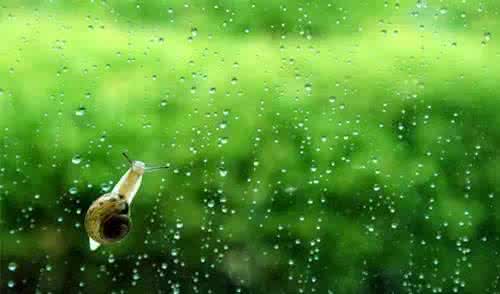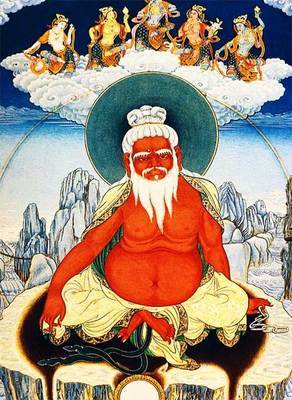故乡的雨
唐弢
江南的春天素称多雨,一落就是七八天。住在上海的人们,平日既感不到雨的需要,一旦下雨,天气是那么阴沉,谁也耐不住闷在狭小的家里;可是跑到外面,没有山,没有湖,也没有经雨的嫩绿的叶子,一切都不及晴天好;有时阔人的汽车从你身旁驰过,还得带一身泥污回来。
记得六七年前初来上海读书,校里的功课特别忙,往往自修到午夜;那年偏又多雨,淅淅沥沥,打窗飘瓦,常常扰乱我看书的情绪。我虽然不像岂明老人那样额其斋曰:“苦雨”,天天坐在里面嘘气,但也的确有点“深恶而痛绝之”的念头。
可是这种事情只在上海才会有。少时留居家乡,当春雨像鹅毛般落着的时候,登楼眺望,远处的山色被一片烟雨笼住,村落恍惚,若有若无,雨中的原野新鲜而又幽静,使人不易忘怀!尤其可爱的是夜间。不知哪一年春天,我和两个同伴,摇着小船到十里外一个镇上看社戏,完场已是午夜,归途遇雨,船在河塘中缓缓前进,灯火暗到辨不出人面,船身擦着河岸新生的茅草,发出沙沙的声音。雨打乌篷,悠扬疾徐,如听音乐,如闻节拍,和着同伴们土著的歌谣,“河桥风雨夜推篷”,真够使人神往。
这几年投荒到都市,每值淫雨,听着滞涩枯燥的调子,回念故乡景色,觉得连雨声也变了。人事的变迁,更何待说呢!
Rain in My Old Home
Tang Tao
Spring in the south is known to be rainy. During this season, itnever rains there but it remains wet for seven or eight days onend. Dwellers in Shanghai, who usually do not feel the need forrain, will be bored with having to confine themselves in theirclose quarters when outside it is gloomy with rain. While in theopen, seeing no mountains, nor lakes, nor rain-drenched soft greenleaves, you’ll find nothing comparable to a fine day. Sometimes,worse still, a rich man’s car flashing past may splash you all overwith mud.

I remember when I first came to Shanghai to attendschool six or seven years ago, I used to be so very busy with myhomework that I often had to sit up late into the night. As ithappened to be a rainy year, I was often disturbed by thepitter-patter of rain beating down against the window and roof.Indeed, I dislike rain with no less intensity than the elderlygentleman Qi Ming, who sits about moaning about the wet weather allday in his study, over the doorway of which hangs a horizontalboard bearing an inscription in his own hand, “Distressing-RainStudy”.
But that’s something which can be experienced inShanghai only. I’ll never forget the days when I enjoyed the springrain in my native place as a small child. I would go upstairs totake a distant look. The faraway mountains were veiled in a mistyrain. The villages were now visible, now invisible. The wet opencountry was fresh and serene. And the rainy evening was even morelovely. One spring, together with two companions, I rowed a smallboat to a townlet ten li away to see a village opera. At midnight,after the performance was over, we got caught in a rain on the wayhome. The boat made its way slowly and our faces were hardlydistinguishable by the dim light of the lantern. Rustles were heardthe boat rubbed its body against the newly grown green grass by theriver bank. The rain beating on the awning gave off a pleasantsound, as if with musical rhythm and cadence. My com[wwW.aIhUaU.com)panions beganto sing, to the accompaniment of the drip-drop, the local folk songIn a Boat by a Bridge on a Rainy Night. It was trulyfascinating.
In recent years, living, as I do, in a big cityremote from my old home, I invariably feel homesick listening tothe harsh, monotonous drip, drip, drip of the rain. O even thesound of rain has changed, to say nothing of the affairs of humanlife!
一切景语皆情语。本文的景,即四季不同的雨,浸透了作者浓厚的情感,自然真挚,借景点染,以景物烘托,表达了作者对故乡的雨的热爱,对故乡深切的怀念。
唐弢,中国现代著名作家,鲁迅研究家和文学史家。原名唐端毅,字越臣。笔名晦庵,风子等。1913年3月3日生于浙江省镇县一个农民家庭。他从青年时代起,就以鲁迅、茅盾等文化革命前辈为榜样,追求真理和进步。主要作品有杂文《堕民》、《好现象》、《青年的需要》、《新脸谱》、《著作生活与奴隶》;他先后出版《推背集》、《海天集》、《短长书》等杂文集十四卷;《落帆集》、《回忆·书简·散文》、《生命册上》、《劳歌行》等散文诗歌七卷等等。
1913年3月3日,唐弢出生在一户农民家庭里,家境贫寒。作为农民的父亲却深刻明白知识的重要性,坚定地供儿子读书,即使借债也在所不惜。于是,唐弢来到了古唐小学念书。有人嘲讽他:“种田人的儿子也想中状元!”他并没有反驳,只是暗下决心,一定要读好书,干出一番事业来,让人瞧瞧农民的儿子也可以有大出息。1926年,他以优异的成绩考入上海公共租界内的华童公学学习。离别的那天,两个姐姐、三个妹妹哭红了眼睛,母亲偷偷塞给他一元钱,叮嘱他好好照顾自己。她们的眼里充满了希望和期待。他挥着手,坐着船一点一点远去。
到了上海,他年轻的心顿时活跃起来,仿佛走进了一片新天地,对任何事物都充满了新鲜感和好奇心。入学第一年,为纪念“五卅运动”,学生举行游行,大街上,学生和警察激烈冲突。就在他快到车站的一瞬间,一声枪响,一个熟悉的身影倒在他的面前,那是他的同学啊!这幕情景震撼了他,引起他的深思,也为他将来走上革命道路埋下了种子。
爱华网 www.aIhUaU.com欢迎您转载
 爱华网
爱华网


